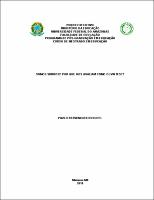| ???jsp.display-item.social.title??? |


|
Please use this identifier to cite or link to this item:
https://tede.ufam.edu.br/handle/tede/6605| ???metadata.dc.type???: | Dissertação |
| Title: | Somos surdos!! Porque nos avaliam como ouvintes?? |
| ???metadata.dc.creator???: | Ruschel, Paulo Berwanger  |
| ???metadata.dc.contributor.advisor1???: | Ferreira, Lúcio Fernandes |
| ???metadata.dc.contributor.referee1???: | Ferreira, Lúcio Fernandes |
| ???metadata.dc.contributor.referee2???: | Cabral, Cinara Calvi Anic |
| ???metadata.dc.contributor.referee3???: | Matos, Maria Almerinda de Souza |
| ???metadata.dc.description.resumo???: | Este estudo investigou as percepções dos acadêmicos surdos sobre o processo de avaliação da aprendizagem na educação a distância em duas dimensões: o modelo desenvolvido e os instrumentos aplicados. O trabalho busca oportunizar à instituições que acolhem discentes surdos, a possibilidade de refletirem sobre seus processos avaliativos respondendo se estes atendem as especificidades de aprendizagem destes sujeitos. Trata-se de pesquisa qualitativa, descritiva, interpretativa onde utilizamos a Entrevista Narrativa para a construção dos dados, que foram analisados sob o prisma da Análise Textual Discursiva (ATD). Os participantes da pesquisa são alunos surdos do ensino superior na modalidade Educação a Distância – EaD, de cursos diversos os quais comunicam-se utilizando a língua brasileira de sinais. O contexto da pesquisa foi um polo de ensino superior semipresencial na cidade de Manaus. Sustentados pela visão sócio-antropológica sobre a surdez, foram articulados conceitos sobre a construção identitária e cultural do surdo, bem como, o percurso histórico relacionado à sua educação até o ensino superior. Também caracterizamos a educação a distância, trazendo sua história e atores pedagógicos; conceituamos ainda, a avaliação da aprendizagem e seu desdobramento no contexto inclusivo. O metatexto interpretativo, resultado da análise, nos permitiu discutir teoricamente, as categorias elencadas: enfrentamento da língua portuguesa – L2 e instrumentos avaliativos adaptados. Concluímos que o surdo tem grande dificuldade frente à língua portuguesa, majoritária e empregada no modelo de avaliação, pois não possui o seu domínio técnico, como também, seu letramento acontece de forma deficitária, uma vez que foi alfabetizado em língua de sinais, ainda que tardiamente. Consumamos também que, os surdos constroem toda sua experiência cognitiva utilizando a língua viso-espacial e conteúdos imagéticos. Portanto, os instrumentos avaliativos aplicados devem considerar estas especificidades, exigindo um repensar da pedagogia em suas práticas, considerando ainda o que prescreve a legislação vigente. |
| Abstract: | This study investigated the perceptions of deaf students about the process of evaluating learning in distance education in two dimensions: the developed model and the applied instruments. The work seeks to provide opportunities to institutions that host deaf students, the possibility of reflecting on their evaluation processes responding if they are according to the specificities of these subjects. This is a qualitative, descriptive and interpretive research where we used the Narrative Interview to construct the datas, which were analyzed under the prism of the Discursive Textual Analysis (ATD). The research actors are deaf students of higher education in the Distance Education modality - EaD, several courses communicate using the Brazilian sign language. The context of the research was a semipresencial higher education polo in the city of Manaus. Sustained by the socio-anthropological vision on deafness, concepts were articulated about the identity and cultural construction of the deaf, as well as the historical course related to their education to higher education; we also characterize distance education, bringing its history and pedagogical actors; we conceptualize the evaluation of learning and its unfolding in the inclusive context. The interpretive metatext, the result of the analysis, allowed us to discuss theoretically the categories listed: confrontation of the Portuguese language - L2 and adapted evaluative instruments. We infer that the deaf person has great difficulty with the Portuguese language, which is the majority and applied in the evaluation model, since he does not possess his technical mastery, but his literacy happens in a lossy way, once the same was literate in sign language, in a late way. We verified that the deaf construct all their cognitive experience using the viso-spatial language and imaging contents. Therefore, the evaluative instruments applied must consider these specificities, requiring a rethinking of pedagogy in their practices, considering also what prescribes the current legislation. |
| Keywords: | Educação de surdos Avaliação da aprendizagem Educação a distância Ensino superior |
| ???metadata.dc.subject.cnpq???: | CIÊNCIAS HUMANAS: EDUCAÇÃO: ENSINO-APRENDIZAGEM: AVALIAÇÃO DA APRENDIZAGEM |
| Language: | por |
| ???metadata.dc.publisher.country???: | Brasil |
| Publisher: | Universidade Federal do Amazonas |
| ???metadata.dc.publisher.initials???: | UFAM |
| ???metadata.dc.publisher.department???: | Faculdade de Educação |
| ???metadata.dc.publisher.program???: | Programa de Pós-graduação em Educação |
| Citation: | RUSCHEL, Paulo Berwanger. Somos surdos!! Por que nos avaliam como ouvintes??. 2018. 112 f. Dissertação (Mestrado em Educação) - Universidade Federal do Amazonas, Manaus, 2018. |
| ???metadata.dc.rights???: | Acesso Aberto |
| ???metadata.dc.rights.uri???: | http://creativecommons.org/licenses/by-nc-nd/4.0/ |
| URI: | https://tede.ufam.edu.br/handle/tede/6605 |
| Issue Date: | 22-Aug-2018 |
| Appears in Collections: | Mestrado em Educação |
Files in This Item:
| File | Description | Size | Format | |
|---|---|---|---|---|
| Dissertação_Paulo B Ruschel | 1.86 MB | Adobe PDF |  Download/Open Preview |
This item is licensed under a Creative Commons License





